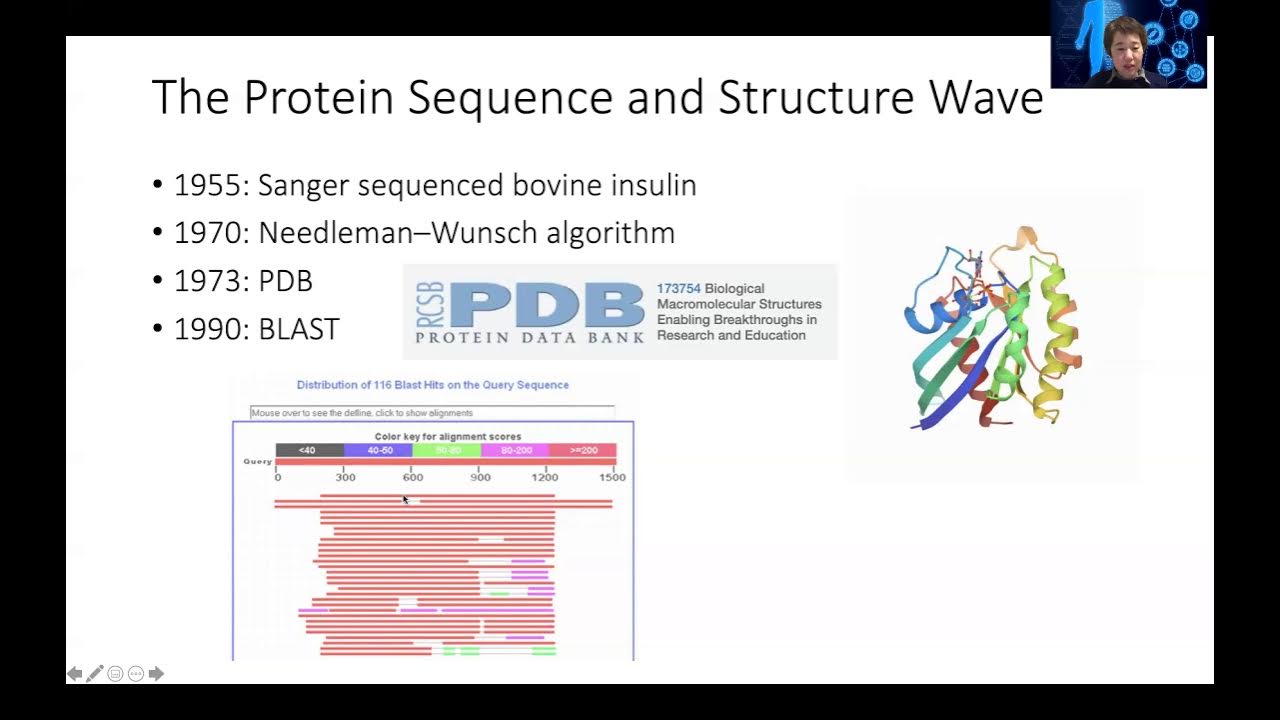생물학 50년 난제 해결한 인공지능 '알파폴드', 생물학,의학 패러다임의 대전환?! [안될과학-초긴급과학]
Summary
TLDRA groundbreaking AI achievement, AlphaFold has successfully predicted protein structures with remarkable accuracy, revolutionizing the field of biotechnology. Proteins, essential for biological processes, are often difficult to analyze due to their complex 3D folding. AlphaFold, trained on massive datasets of protein structures and DNA information, can now predict how proteins fold, offering significant potential for drug development, disease treatment, and understanding biological systems. While the technology has made impressive strides, challenges remain in predicting protein interactions and complex biological systems. Still, AlphaFold represents a transformative shift in how we approach biology and medicine, with vast implications for the future.
Takeaways
- 😀 AI has successfully predicted protein structures with high accuracy, marking a breakthrough in science.
- 😀 Protein structures are essential for understanding how proteins function and their impact on biological processes.
- 😀 Predicting protein folding is difficult due to the vast number of possible configurations proteins can adopt.
- 😀 The structure of proteins can change their properties, influencing everything from virus behavior to cancer treatment.
- 😀 Traditional methods of determining protein structures, like X-ray crystallography, are costly and time-consuming.
- 😀 The Protein Structure Prediction competition, launched in 1994, led to the development of AlphaFold.
- 😀 AlphaFold uses AI to predict protein structures by analyzing patterns in known genetic and protein data.
- 😀 In 2020, AlphaFold achieved a remarkable accuracy score of 87, significantly outpacing other methods.
- 😀 AlphaFold has already contributed to understanding the coronavirus spike protein, aiding in vaccine development.
- 😀 The future potential of AlphaFold includes predicting billions of protein structures, revolutionizing drug discovery and disease treatment.
- 😀 Despite its success, AlphaFold faces challenges with predicting protein-protein interactions and complex protein assemblies, which still require improvement.
Q & A
What is the significance of the recent breakthrough in protein structure prediction?
-The breakthrough is significant because it allows for the high-accuracy prediction of protein structures, a crucial step for understanding diseases, developing treatments, and advancing biological research.
Why is protein structure so important in biological research?
-Protein structure determines its function, and even slight changes in structure can have a major impact on how proteins work. This is essential for understanding biological processes, diseases, and developing drugs.
What makes determining protein structure so difficult?
-Proteins fold into complex 3D shapes that are difficult to predict, and traditional methods like X-ray crystallography are expensive, time-consuming, and not always feasible for large-scale research.
How did scientists traditionally determine protein structures before the AI breakthrough?
-Before AI, scientists used methods like X-ray crystallography to determine protein structures. This involved using high-cost equipment and was slow, often requiring extensive time and resources.
What is AlphaFold, and how does it contribute to protein structure prediction?
-AlphaFold is an AI system developed by DeepMind that predicts protein structures based on amino acid sequences. It uses machine learning to analyze patterns in genetic and structural data to make accurate predictions.
What was AlphaFold’s score in the 2020 protein structure prediction competition?
-In 2020, AlphaFold achieved a score of 87, demonstrating a significant improvement over previous AI models and outperforming other teams by a wide margin.
How does AlphaFold's prediction process work?
-AlphaFold uses AI to analyze known DNA and RNA sequences, learning the relationship between genetic information and protein structures. It then predicts the 3D structure of proteins with remarkable accuracy.
What are the potential applications of AlphaFold's technology in medicine?
-AlphaFold can revolutionize drug development, cancer treatment, and viral research. It can predict protein structures involved in diseases, aiding in faster, more targeted drug development with fewer side effects.
What are some of the limitations of AlphaFold’s predictions?
-AlphaFold still struggles with predicting protein interactions, complex protein formations, and the exact positioning of every amino acid. These challenges are due to the complex nature of biological systems.
What is the potential future impact of AlphaFold and similar AI technologies?
-AlphaFold and similar AI technologies have the potential to greatly accelerate scientific discoveries, enabling researchers to understand diseases better, predict new proteins, and even develop treatments for previously untreatable conditions.
Outlines

Cette section est réservée aux utilisateurs payants. Améliorez votre compte pour accéder à cette section.
Améliorer maintenantMindmap

Cette section est réservée aux utilisateurs payants. Améliorez votre compte pour accéder à cette section.
Améliorer maintenantKeywords

Cette section est réservée aux utilisateurs payants. Améliorez votre compte pour accéder à cette section.
Améliorer maintenantHighlights

Cette section est réservée aux utilisateurs payants. Améliorez votre compte pour accéder à cette section.
Améliorer maintenantTranscripts

Cette section est réservée aux utilisateurs payants. Améliorez votre compte pour accéder à cette section.
Améliorer maintenantVoir Plus de Vidéos Connexes
5.0 / 5 (0 votes)






